- Home
- Patrick Robinson
H.M.S. Unseen Page 44
H.M.S. Unseen Read online
Page 44
“Since I am sitting here thinking and reading the paper,” replied Adnam, “I suppose I may as well earn some money for it.” But then he smiled, and said, “Admiral, I think that would be an excellent way to start off our relationship. Might save me the trouble of taking cyanide.”
“Then we are agreed? You trust me sufficiently?”
Commander Adnam held up his handcuffed wrists. “I don’t really have very much choice, do I? If I do not agree, you could always go immediately to Option One, despite the uncomfortable consequences for you, as well as me.”
Admiral Morgan nodded. “Yes. And now I would like to talk to you, and so would Bill, whom I believe you know well enough?”
“Yes, I think so. We have a few things in common.”
“Right. If I yell ‘coffee’ loud enough, will something happen?”
“I think so. There is a housekeeper for the agents and the Marine guards.”
“I’ll go and find someone, Arnold,” said Bill. “But I bet they don’t have buckshot.”
The admiral grinned, but he was very preoccupied, and he turned to Ben Adnam, and said deliberately, “My President does not believe that Iraq should get away with shooting down three airliners, in the process murdering our oil-negotiating team, six politicians, and the Vice President of the United States. Neither has it escaped him that we, as yet, have taken no retribution against them for the loss of the aircraft carrier.
“We now propose to attend to these matters, with or without your help. But I hope with.”
Adnam nodded.
“Now, you mentioned yesterday that you could offer a way for us to deal with Iraq on a long-term basis. Could you elaborate on that?”
As the Iraqi again nodded his assent, Bill came in with the coffee. Three mugs. All black. A blue tube of sweeteners on the side.
“That’s one fucking miracle,” said the admiral, firing the little white pellets into the coffee, somehow making the clicker sound like a six-shooter. “Now let’s see if young Ben here can come up with a second.”
Despite himself, Commander Adnam laughed. He thought he might enjoy working with this American cowboy. “Admiral,” he said, “one of the biggest problems in Iraq is water. We have two great rivers, the Euphrates and the Tigris. Both of them flow out of Turkey, and the Euphrates crosses Syria. Those two rivers are the lifeblood of Iraq. They are the reasons civilization flourished in ancient Mesopotamia, the old name for modern Iraq.
“The rivers still control the country’s agriculture, wheat and barley, both irrigation and direct pumping. They control fertilizer plants, cement-making plants, light industry, the production of steel, the growing of dates. They control Iraq’s drinking water and hydroelectric power. For centuries, when the water level dropped, and occasionally dried up in some areas, there was something close to national panic. But it was even worse when they flooded, as they often do at the end of the winter. Right back to biblical times…I expect you both know that Noah and his Ark were in Mesopotamia in that great flood.
“In order to control these waters, various governments have built a succession of dams and barrages and canals. These in turn helped to form lakes and reservoirs, which first of all absorb the floodwater, and secondly provide enormous backup when the rivers are very low.
“There is one at Dukan on the Tigris, others at Mosul and Al Hadithah. There is a huge one at Darband-I-Khan right up in the Kurdish Mountains on a tributary called the River Diyala. There is another at Basdush and Fathah, both on the Tigris. Another on a tributary, the Great Zab; a critical one at Samarra, the Samarra Barrage. There are several also on the Euphrates, at Habbaniyah, Hindiya, and Ash Shinafiya.
“But the most important ones are at Darband-I-Khan and Samarra. The Darband Reservoir stands at the southern end of a massive lake. It is surrounded by mountains, 130 miles northeast of Baghdad. It contains 3 cubic kilometers of water. Imagine that? A reservoir 4 miles long, 3 miles wide, and a quarter mile deep. The Samarra Barrage, about 76 miles north of the city, right on the Tigris, holds 85 billion cubic meters of water.
“If I were you, I’d blow out both those dams, and Iraq’s economy would collapse for several years.
“Once you get out of the northeastern mountains, it’s a flat country, and the flooding would be ruinous. But the distances are so great there would be no serious loss of life. The water would rise relatively slowly over the key areas, along the river. People would have time to get away. I know that because the government has made careful studies of the consequences of a dam failure. I’ve seen them. We’d just have a lot of factories that no longer worked, a lot of crops that would not grow, a lot of flooded oil fields. And a lot of flooded towns and villages. The country would be forced to throw itself on the mercy of the West.”
“Jesus,” said Arnold and Bill, almost simultaneously.
“The trouble is, Admiral. You don’t have long. I read that winter stayed late in the mountains, which buys you some time. But if you want to strike hard, you need to do it while the snows are still melting, when the water in the reservoirs is at maximum height. I’d say you have about another four weeks maximum. By mid-June the levels really start to evaporate in the heat. All the Iraqi government studies show that flooding would be 50 percent worse if it happened at the end of the snowmelt.”
“Jesus Christ,” said the Admiral. Bill Baldridge looked amazed.
“I know it sounds perfect for our purposes,” said Arnold Morgan. “But it would be absolutely impossible. We’d have to use Special Forces, train them, get ’em into the mountains somehow, through Turkey, then have them operate deep underwater, against the inner wall of the dams. Christ, we’d need about 50 guys. It would be like declaring war. And they might get caught.”
“How marvelously old-fashioned,” said Commander Adnam. “That’s out of the question. Admiral, you don’t use people, you use missiles. Cruise missiles.”
“Missiles? Jesus, that’s like a world war. We can’t just stand a ship off, in the Gulf, or the Med, or somewhere, and start throwing big missiles at a couple of major Iraqi dams. The world community would go crazy with indignation. And we could never admit why we were doing it. I’m sorry, Commander, but that would be out of the question. Everyone would see a big missile launch from an American warship. The whole world would know what we had done, and we could not afford that.”
“They wouldn’t know if you did it from a submarine.”
“A submarine…of course.” The admiral never minded being outthought. “We could do that, maybe from the middle of the Gulf. But a missile big enough to come straight in and blow the wall of the dam right out? I don’t think there is a missile big enough to do that. At least not one that would fit into a submarine.”
“Not just one. How about six of them, Admiral? One after the other, all hitting the wall of the dam in precisely the same spot, until it gives way?”
“Commander, can you just imagine the scene? The Iraqi defensive force at the dam, and I’m sure they have one, standing there watching these big missiles coming in, belching fire, slamming into the wall, one after the other. It would be like Hiroshima. And, within hours, it would be world news, because there is only one nation that could send in cruise missiles like that. The United Nations would hang us out to dry…leave us swinging in the wind.”
“Not if the missiles came in from the other side, and made their final approach in the dark, right above the water,” replied Commander Adnam. “Then dropped into the water a couple of hundred yards short.”
For the first time, Arnold Morgan was totally silent.
“By which time, sir, the submarine that fired them would have slipped under the water and headed out of the strait, deep and quiet…long gone, and no one would ever know.”
“Holy Shit,” said the President’s national security advisor. “This is fucking unbelievable.”
“No it’s not, Arnold,” interjected Ben. “You have a missile that would do it. But you’d have to modify it. Because it could
make its final approach under the water.”
Arnold Morgan took a deep swig of his coffee, rubbed his chin in a gesture of rumination. “Commander Adnam, I want to say just one thing. I knew you were extremely clever, but your grasp of this kind of warfare has surprised me. Welcome to the U.S. of A.”
It was Bill Baldridge who was now completely preoccupied, and he ignored the admiral’s compliment to the prisoner. “Ben’s thinking about the Raytheon Tomahawk land-attack missile,” he said. “One of those big submerged-launch cruises. It had a special navigation system, they called it TERCOM-aided. You know, preprogrammed into its computer…you just bang in the way points. This is the sucker that can be launched from a Los Angeles-Class boat…and it has a hell of range, 2,500 kilometers, about 1,550 miles, which I think would get us up the Gulf, from Hormuz.”
“Yes. Yes it would,” said the admiral thoughtfully. Then, turning to Ben Adnam, he said, “Lieutenant Commander Baldridge was a weapons officer in the United States Navy. Submarines…nuclear specialist.” The Iraqi nodded respectfully.
The admiral continued. “Didn’t we fire some of those missiles at Iraq from submarines, in the Med, during the Gulf War?”
“We did. Those Tomahawks can hit just about anything within range. No mistakes. They’re accurate now to within about 6 feet.”
“Remind me. How many can the submarine carry?”
“Eight minimum. Later boats can carry up to twelve.”
“How about this underwater bullshit?”
“That’s the special part,” said Ben. “I don’t think it should be too difficult. The Brits solved it sixty years ago. What was he called? Burns Morris? You know, the dam-buster fellow.”
“I guess you’re referring to Professor Barnes Wallis,” said Bill, pompously for a cowboy.
“Burns Wallis…Barnes Morris…what the hell? I refer to the World War II inventor who came up with the bouncing bomb…our problem is, cruise missiles don’t bounce. So…our problem is going to be slowing the missile down for entry into the water. We’ll have to use parachutes, because the speed’s gotta come down from MACH-.7—about 450 knots—to 30. Then it has to hit the water, moving through the last 200 yards, making a slow, shallow trajectory along its preprogrammed course, down to the target, somewhere near the base of the dam wall, which is probably 100 feet thick, 100 feet below the surface.”
“One of those missiles wouldn’t breach it?”
“No. But the first payload should smash the outside concrete layer, driving cracks maybe 40 feet into the wall. Then the second one bangs into the same exact spot, and makes those cracks wider, maybe 80 feet into the wall. Then the third one smashes in, and probably drives the cracks right through. The wall might go right then. But it’ll go with the impact of the fourth one. The last two would just be for good measure, in case one of them failed. As you well know, a cruise missile of this size could knock down the White House, blow up a destroyer. That dam wall would not have a prayer against four of them, never mind six.”
“How about the propulsion of the missile under the water?”
“That’s not a problem. We can do it using the weapon’s residual speed. Fast through the air, then into the water for the last couple of hundred yards. They turn into a kind of torpedo.”
“Commander Adnam, are you sure of the extent of the damage if we hit Darband and Samarra?”
“Very sure. If you remember, there was a fierce battle during the Iraq-Iran War at a place called Halabjah, which is a Kurdish town in the southeast of their area, right up there in the mountains, a couple of miles east of Darband. The Iraqis fought like tigers for that town, after the Iranians had captured it in the winter of 1988. And they succeeded, drove the Iranian tanks back. But there were allegations that Iraq had used chemical weapons in retaking this little place up near the borders of the two countries.
“There was, however, more to it than that. Iraqi Intelligence had heard the Iranians were planning to blow the big dam at Darband, and Iraq could not allow that. And no price was too high to pay in order to stop them. Even the fury of the whole world over chemical weapons. That dam, and its massive hydroelectric plant, and the one at Samarra, very nearly represent life and death to the very fragile economy of Iraq.
“If they were both blown at the same time, it would wreak havoc. Imagine the situation after the Samarra dam had gone, massive flooding right down to Baghdad, and then another vast volume of water cascading out of the Darband mountains…to meet the mainstream of the Tigris just below the center of the city.”
“Doesn’t sound great,” agreed Admiral Morgan. “How long do you estimate it would keep Iraq out of action?”
“I’d say ten years. At least that’s what they thought might happen when the Iranians threatened Darband back in 1988.”
“How far will the missiles have to travel to the dams, Bill?”
“Well, that’s the problem…the eternal problem for weapons officers. Bigger the target, bigger the warhead. Otherwise, you end up kicking away at an iceberg with a toothpick. And unless you want to end up with a missile the size of the Washington Monument, you always have to sacrifice range…what I’m really saying is you can send a minor warhead 1,500 miles, but the same missile will carry a big warhead only, say, 500 miles. The size of the missile is finite. You either carry fuel or explosive. Every time you increase one, you have to cut back on the other. We’ll have to make significant adjustments in design.”
“Billy, you’re not saying we can’t do it, are you?”
“No, Arnie, ’course not. But I am just cautioning everyone we do have to trade a lot of range for a lot of extra bang. When I last looked at this sort of trade-off, range was the limiting factor for the payload. Not the other way around.
“Back in ’91, we were taking a very serious look at those Iraqi dams, and for a while we thought we could knock ’em down with modified Tomahawk missiles. We were looking at two launch-area options: one at the eastern end of the Med, one at the northern end of the Gulf.
“We knew we would need a ton of missiles per dam, which meant we had to fire half of ’em from the Med. But that option required the missiles to fly at least 600 miles. And that gave us a real problem. We just couldn’t get a big enough warhead to travel that far. Couldn’t hold enough fuel if we were carrying that much explosive. Not without a complete redesign of the entire airframe and power plant…really a brand-new missile, because the 600-mile range was a given. The best we ever did was get it down to 30 missiles per dam. Right about then we stopped thinking about it.”
Bill Baldridge stood up, paced the room, and drank some coffee. “I do seem to remember that Hughes went right ahead with the project. They completed operational trials, but no one ever told me how they came out. By the time they were ready, the goddamned war was over. But I did once hear they made a few. Shouldn’t be difficult to find out what happened to ’em.”
Ben Adnam nodded, already a comfortable member of the team. “It’s about 600 miles from the Mediterranean to the more easterly dam, Admiral,” he said. “But I have a problem with that routing, simply because it cuts down so drastically on our ability to optimize the actual route. We just don’t have enough gas for a lot of ducking and diving. The bird will have to fly on a steady course almost all the way, quite possibly through heavy Iraqi radar and antiaircraft defense. That has major implications for the survivability of the weapon in transit. And it has implications all of its own—if we want to get 6 home, and we are calculating a possible loss of 2, we need to fire 9. Basically that’s why I hate to launch from the Med.”
The admiral looked up and nodded, a kind of rueful half smile on his face. He just said, “Uh-huh.” But to himself he was thinking, Jesus Christ, is this guy something, or what? He’s only just fucking gotten here, and he’s talking like a lifelong U.S. weapons officer.
“How many of these missiles do you think we got, Bill?”
“Dunno. Hughes may have bagged ’em, for all I know. I’ll check it out right
away. Even if we pull it off, we’ll still need two launch vehicles.”
“That better not be a problem either,” growled Arnold Morgan. “Because if it is, someone’s in deep shit.”
Bill Baldridge continued. “Look, we might get this thing done at short notice. But I have to check out, for a start, the status of those missiles. Then how many ships we have modified to launch these birds…and where they are…who’s nearest our launch areas. I ought to get through with that today…the main routing stuff gets done by the targeting-computer team…and before their machine spits out all our options, we need to feed in every scrap of information…the topography…every hill and valley…every intelligence report detailing Iraqi defensive positions along the way…right up-to-date, which it always is. But I shall want to talk to Ben. He might have some input.
“The computer guys will understand right away that our 600-mile maximum flight path is the critical factor. They’ll come up with options for us. Then we can start to make a few hard decisions, about the launch area and the vehicles that will fire the missiles.”
“Okay, Bill. Sounds like you two are on top of this. But remember, this thing is not simply a high-tech problem. We have to give real consideration to the political side as well. We have to find a way to make some serious evasions in-flight; otherwise, these bastards may leave a trail that goes straight back to the Pentagon. We gotta try the best we can to keep ’em right off the Iraqi radar…we gotta try every twist and turn to stop anyone from finding out where they came from.”
“And we don’t want to make it too obvious where they’re headed to, either,” said Ben. “I suppose if you do happen to see a line of these things whipping through the skies at six hundred knots, you don’t have a lot of time to do much about it. Better not to take any chances though.”

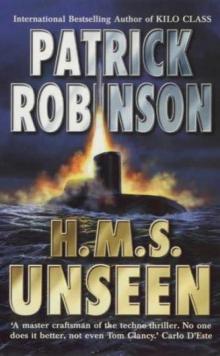 H.M.S. Unseen am-3
H.M.S. Unseen am-3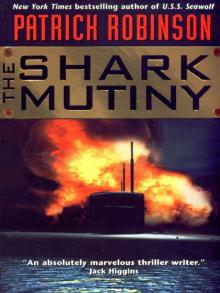 The Shark Mutiny (2001)
The Shark Mutiny (2001)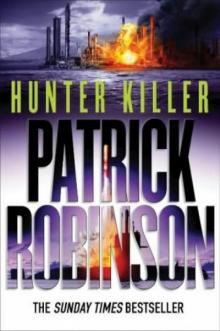 Hunter Killer am-8
Hunter Killer am-8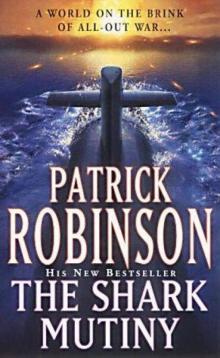 The Shark Mutiny am-5
The Shark Mutiny am-5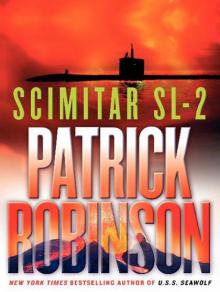 Scimitar SL-2
Scimitar SL-2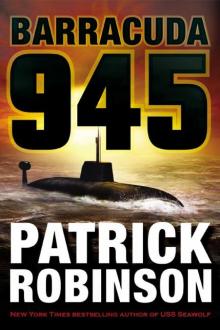 Barracuda 945 am-6
Barracuda 945 am-6 Hunter Killer
Hunter Killer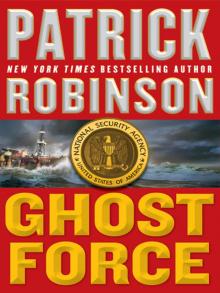 Ghost Force
Ghost Force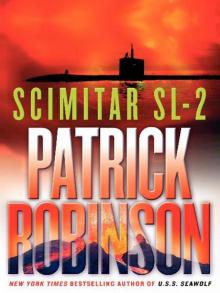 Scimitar SL-2 (2004)
Scimitar SL-2 (2004)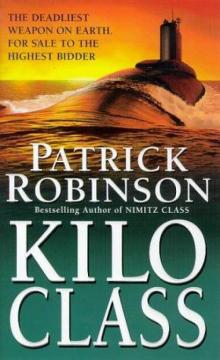 Kilo Class am-2
Kilo Class am-2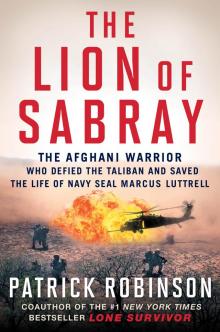 The Lion of Sabray
The Lion of Sabray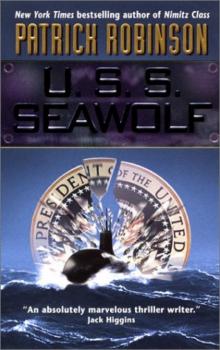 U.S.S. Seawolf am-4
U.S.S. Seawolf am-4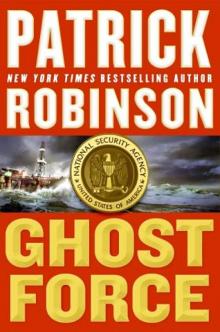 Ghost Force am-9
Ghost Force am-9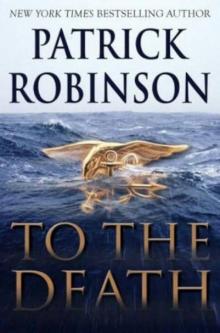 To the Death am-10
To the Death am-10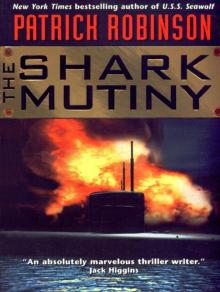 The Shark Mutiny
The Shark Mutiny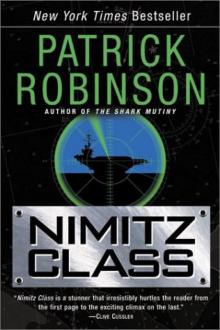 Nimitz Class am-1
Nimitz Class am-1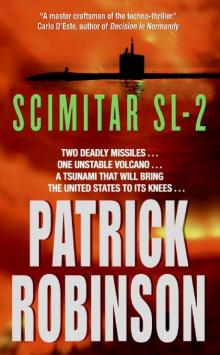 Scimitar SL-2 am-7
Scimitar SL-2 am-7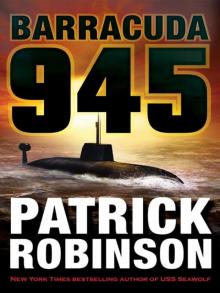 Barracuda 945
Barracuda 945 Intercept
Intercept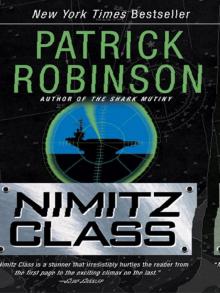 Nimitz Class (1997)
Nimitz Class (1997)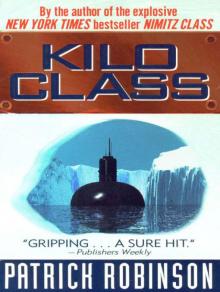 Kilo Class
Kilo Class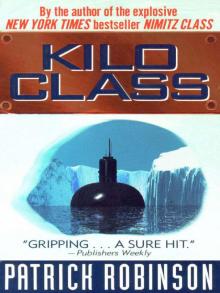 Kilo Class (1998)
Kilo Class (1998) Diamondhead
Diamondhead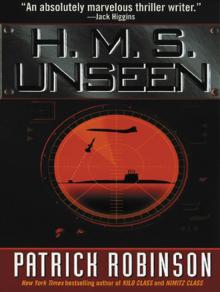 H.M.S. Unseen
H.M.S. Unseen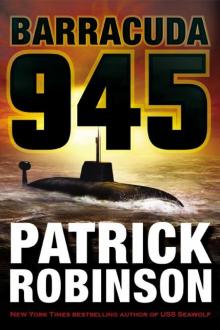 Barracuda 945 (2003)
Barracuda 945 (2003)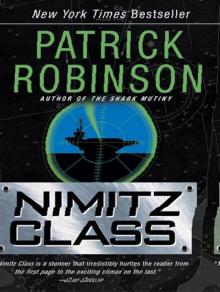 Nimitz Class
Nimitz Class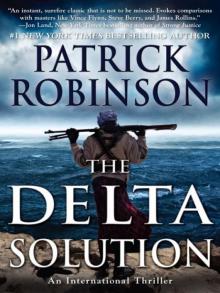 The Delta Solution
The Delta Solution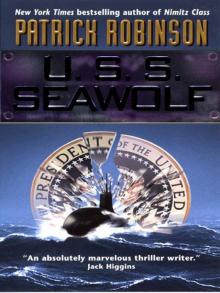 U.S.S. Seawolf
U.S.S. Seawolf